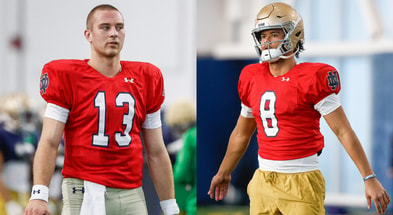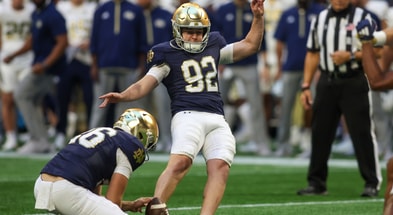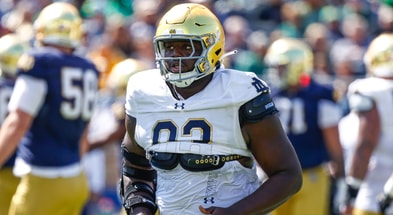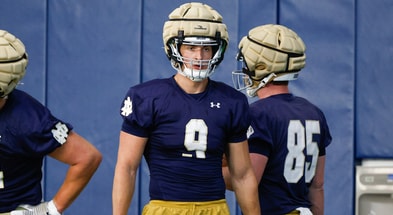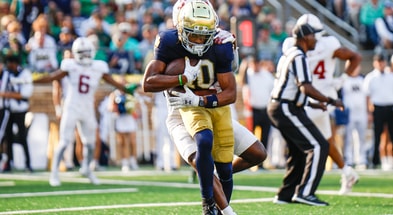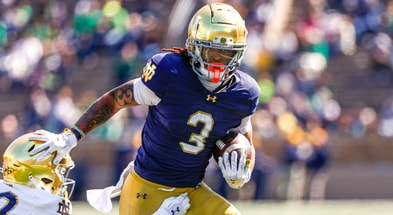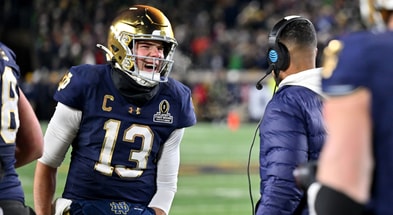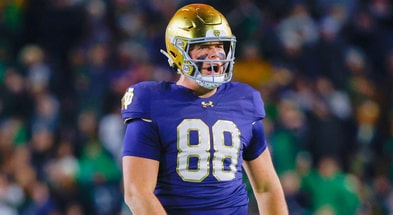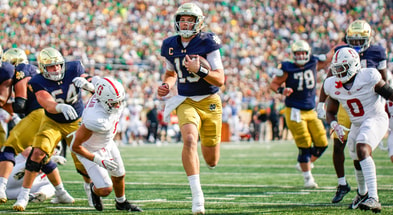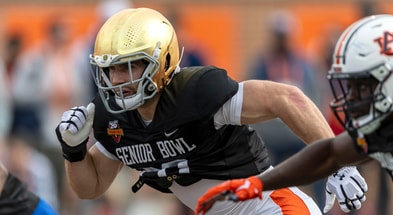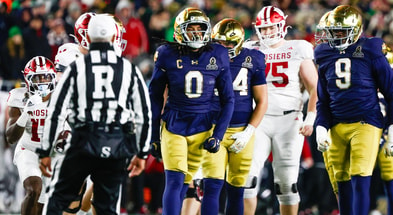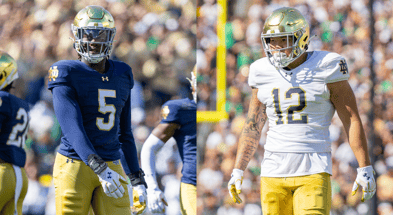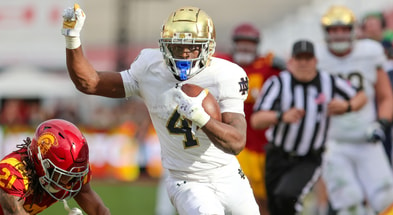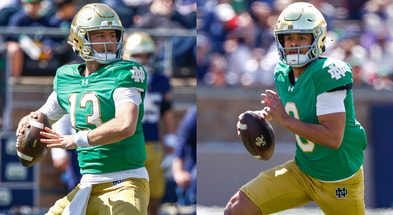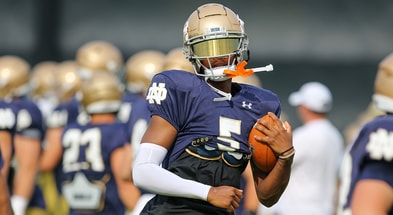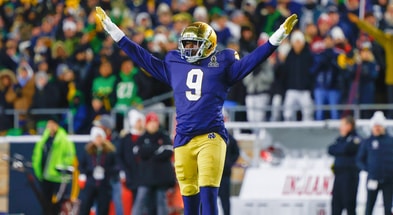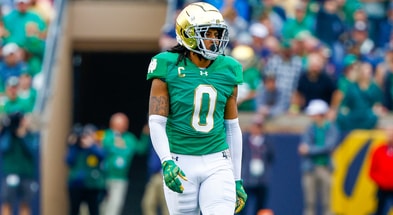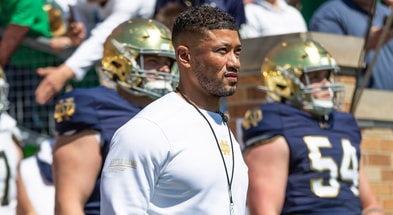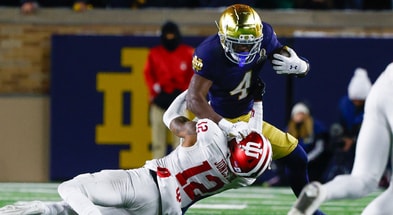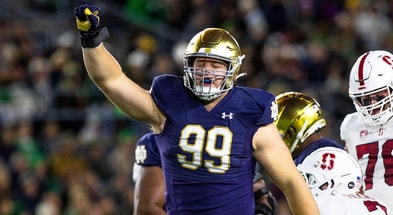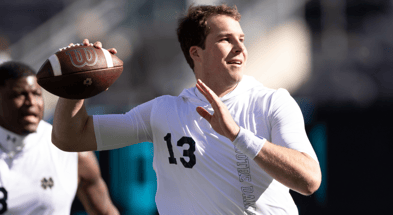Quick-hitters: Notre Dame OC Gerad Parker on his history, future
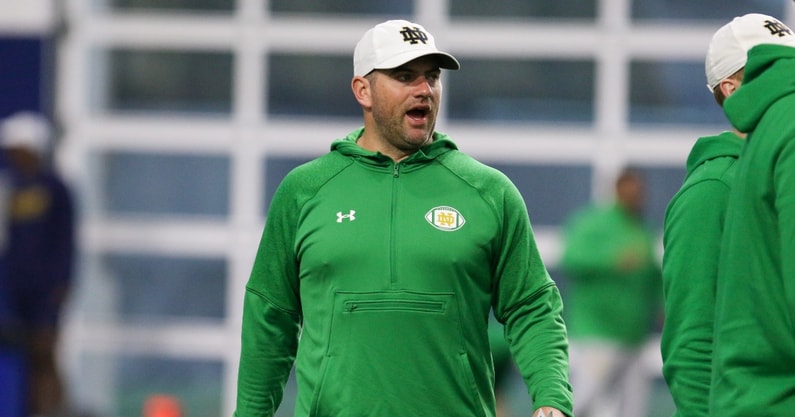
As a native of a small town in Kentucky customarily would, new Notre Dame offensive coordinator Gerad Parker started his first press conference as the Fighting Irish OC thanking head coach Marcus Freeman, the university’s administration and his family for being so supportive of him in making his next venture possible.
The epitome of southern gratitude.
“Nobody is more charged to do this job than I am,” Parker went on to say. “Every morning I wake up from this moment forward will be to put my feet on the ground and make this the right hire for Coach Freeman and everybody in this organization.”
Here’s more of what Parker said in his introductory press conference.
On his background
“What my mom and dad did and what Louisa (Ky.) did, it was a place as blue-collar as it gets. We were built around a community that loved football. That football success grew around the town. It’s something you want to be a part of. When you grow up in a place that demanded that kind of success in a small town, you naturally have a chip on your shoulder to do great things because you want to prove everyone wrong.
“That grit of what my mom and dad did to raise us, what my brother and sister still do, those things are what shape ya. Still my toughest critics are my parents. I could go on and on about that. They are judging me right now on this show. That’s what drives ya. Being never satisfied with where you’re at and being constantly ambitious about finding ways to make Louisa proud and my family proud are what drive me and will continue to.”
On talking to Notre Dame coaches through the headset on game days
“We’re certainly all on the headsets and communicating with each other as a staff during the games. Me and Tommy [Rees] communicated a lot. So did everybody at certain times. We had a constant line of communication. Coach gives me a hard time, and y’all will learn, I’m a little bit of a talker. I would rather say, ‘Hey, what would you call right here?’ It’s really a way to keep my mind busy so we don’t have to sit there and be nervous about watching a key moment in a game. We talked a lot. I think it’s important to have good interaction.”
On having success in the red zone
“It was a really good focus for me at West Virginia and other places. To be collaborative is something huge because in my opinion it does two things for your staff. Number one, it makes them matter. There is nothing better as an assistant coach than to see work during the game that you helped implement and put in. And it provides them with ownership. You don’t want to have a staff where you take on everything and before you know it, it may create something where they don’t grow. You want to have a collaborative effort.”
On his play-calling duties at West Virginia from 2020-21
“A very clear message was put across when I took the job that I would run unit meetings and a lot of things. I was involved in every facet of building an offensive game plan. Controlling the players over there in unit meetings and all of those things. That was clearly portrayed.
Top 10
- 1New
Johntay Cook
Headed to ACC
- 2Hot
Fan who fell from stands
20-year old former CFB player
- 3Trending
Donald Trump
Wants Saban back as Alabama HC
- 4
Kentucky, St. John's
Set to play in 2025-26
- 5
Bracketology
Way Too Early Tournament projection
Get the On3 Top 10 to your inbox every morning
By clicking "Subscribe to Newsletter", I agree to On3's Privacy Notice, Terms, and use of my personal information described therein.
“During that time, I was offered by coach [Neal] Brown an opportunity to be able to call plays at different times during Year 1. Those will be different moments of red zone and different areas. When my number was called, be prepared. When it wasn’t, serve the head coach and serve the offense.
“Year 2 at a certain time at that point, things changed for a multitude of reasons. When my number was called I was prepared to call those games and called them in entirety. At that time, that’s when things maybe changed to a full scope of calling complete games. I was tremendously grateful for that opportunity. It prepared me for what this one is going to be.”
On how adversity at Purdue and in his personal life led him to this point at Notre Dame
“Any time you go through failure on or off the field, that kind of shows who you really are. Coach Freeman talked about it. When you face things, lean on the people that love you the most and you’re able to stand tall during the tough times, that’s really the difference between good and great in my opinion. There is no experience value on that.
“If you saw the way [Freeman] stood in the fire when we took a tough loss early last year, that tells you everything for the reason he’ll be a successful head football coach here. I want everybody to have the same opinion of me. Failure is going to happen. How we stand tall and own that, which will be my responsibility, will empower our guys. Don’t worry about mistakes. I’ll take on the failures. We’ll go back to work and be just fine.
“But you can tell a lot about a person after doing this job, which [Freeman] alluded to. Because it’s a tough job. This is a tough job. High expectations. All those things. And if you flinch at that, this place will eat you up. And we’ve also worked really hard to get to this point. These are the dreams me and [Freeman] talked about in failure, and a lot of it. The reason we will now have success is because of those and growing stronger because of them. That’s what I will do until my time is done.”

